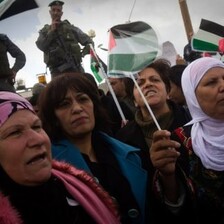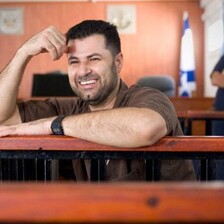The Electronic Intifada 27 December 2010
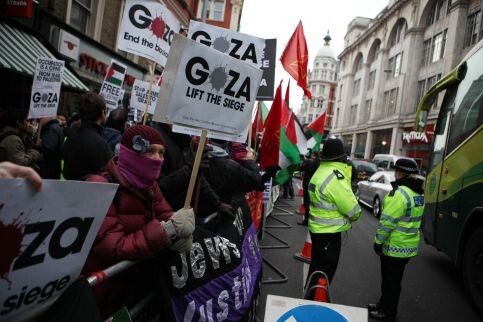
Protesters in London take to the streets near Israel’s embassy on the second anniversary of the start of Israel’s assault on Gaza, 27 December. (Matthew Cassel)
Palestinians and solidarity groups in the United States, United Kingdom and Ireland have organized vigils and political awareness actions on the occasion of the second anniversary of Israel’s winter 2008-09 attacks on the Gaza Strip — during which more than 1,400 Palestinians were killed and thousands more injured.
Meanwhile, Palestinian and international solidarity protesters in the occupied West Bank, including East Jerusalem, continued to be brutalized by Israeli forces while resisting Israel’s continued occupation, land confiscation and settlement expansion policies.
Also last week activists in the US city Seattle attempted to launch a Palestine awareness campaign on city buses.
Gaza commemoration actions
US
American Muslims for Palestine (AMP) stated that it will cosponsor a rally in New York City on 27 December, the day that Israel began its three-week assault in 2008. The event kicks off a national education campaign and tour including 25 events in 14 cities across the US related to the ongoing humanitarian situation inside Gaza (“Honor Gaza by joining rally in New York City marking two years since Operation Cast Lead,” 21 December 2010).
The Seattle Mideast Awareness Campaign is organizing a walking vigil on 27 December as well (“Join us December 27: Remember Gaza”).
United Kingdom
Jews for Justice for Palestinians (JFJFP) is helping to organize a protest outside of the Israeli consulate in London on 27 December (“Mark the 2nd anniversary of Cast Lead - London vigil, 27 December, 1-3pm”).
Ireland
Solidarity activists with Act for Palestine Ireland are holding a similar action outside the Israeli embassy in Dublin, also on 27 December (“Vigil for the 2nd anniversary of Operation Cast Lead”).
Israeli forces repress activists in Beit Ommar
On 23 December in the southern West Bank village of Beit Ommar, Israeli forces invaded the home of Ibrahim abu Maria, member of the National Committee Against the Wall and Settlements in Beit Ommar, a grassroots organization which combines political activism with social programs and community support. Israeli forces beat his wife, Fadwa, when she refused to let the soldiers occupy the roof of their home. The Palestine Solidarity Project (PSP) reported that Fadwa was beaten on her face and head by the soldiers as she attempted to protect her children, ages 6 and 11. “Her neighbor, Mona abu Maria, heard the home invasion and came over to assist her and her family,” PSP reported on its website (“Israeli military attacks women, children, wedding during Beit Ommar invasion,” 23 December 2010).
PSP added that an Israeli soldier threw a sound grenade which exploded beside her arm, and that over the next half hour, members of the National Committee and approximately 150 residents of the village converged on the house and demanded that the Israeli soldiers leave.
“Soldiers then fired live ammunition from inside Fadwa’s home at the converging crowds,” PSP reported. “Undeterred, the residents held their ground and the Israeli military forces retreated to the [nearby Karmi Tsur] settlement.”
PSP stated that an hour later, Israeli soldiers once again invaded the village and fired “copious amounts” of tear gas into a wedding celebration. Several residents were treated for tear gas inhalation.
“During the entire operation, no one was arrested or interrogated,” PSP reported. “Though Fadwa’s house was torn apart, there was no objective to the invasion, indicating once again that the Israeli military, in collusion with illegal Israeli settlers, are attempting to harass and intimidate a community which has engaged in nonviolent direct action against the occupation and the presence of illegal settlements on their land.”
Earlier in the week, three international solidarity activists were arrested and detained during a weekly protest against the ongoing confiscation of village land for the expansion of the illegal Karmi Tsur settlement. PSP reported that approximately 60 people took part in the demonstration on 18 December, which was accompanied by a group of Israeli drummers (“Soldiers occupy house and attack demonstrators, arresting three activists,” 18 December 2010).
“As the demonstration was starting, a group of ten Israeli soldiers occupied the house of a local family at the southern edge of the village,” PSP stated. “The terrified family of five was forced into a separate room while the soldiers used their house as a vantage point from which to observe the demonstrators. The soldiers remained in the residence for a total of three hours.”
PSP added that soldiers attacked the unarmed demonstration with sound grenades and high-velocity tear gas canisters, firing them at the heads of demonstrators, and preventing the group from reaching the settlement wall where they planned to protest.
One Italian citizen and two Israeli solidarity activists were arrested and detained by Israeli forces.
Occupied West Bank
Al-Walaja
Also on 23 December, eight Palestinian activists were arrested during a nonviolent demonstration in the village of al-Walaja, near Bethlehem along the so-called “seam zone” boundary with Israel. Dr. Mazin Qumsiyeh, a professor at Bethlehem University and the chairman of the Palestinian Centre for Rapprochement Between People, was amongst those arrested while attempting to “peacefully” stop Israeli bulldozers from destroying the village’s land where Israel plans to extend the wall (“Israeli troops kidnap Mazin Qumsiyeh and 7 villagers from Al-Walajah,” International Middle East Media Center, 23 December 2010).
Dr. Qumsiyeh’s wife, Jessie, reported to the International Middle East Media Center (IMEMC) that the protesters had managed to delay the operation of the bulldozer for thirty minutes. However, a military spokesman later informed the protesters and residents of al-Walaja that the work would resume. At that point, soldiers began arresting eight Palestinians at the scene, including Dr. Qumsiyeh.
“An Israeli soldier named Almog Kahalani was very rough with them,” Jessie Qumsiyeh told IMEMC. “He beat the two young Palestinian men, causing one [to have] stomach problem[s] … They were asked to sign on a piece of paper … But every one of them refused to sign as advised by a Palestinian lawyer who was present there. While detained there, they tried to speak to the soldiers about international law, but the soldiers were saying ‘they don’t give a f—- ’ about international law and you people and they only care about obeying orders.”
Al-Maasara
A Palestinian protester in a Santa Claus suit led a demonstration with dozens of solidarity activists on 17 December in the village of al-Maasara, near Bethlehem, to protest the ongoing construction of Israel’s wall and the confiscation of village land. Israeli soldiers attacked the demonstration with tear gas grenades and arrested one Israeli activist.
In a video posted on YouTube, the protester dressed as Santa urged people to “come witness what these criminals are doing … come see what’s happening in Palestine.” Demonstrators held a sit-in on the main road to the village, and sang songs (“Israeli Army Attacks Nonviolent Demonstrators”).
Two weeks prior, members of the South African Tripartite Alliance reported that Israeli forces attacked their delegation with tear gas and sound grenades as the group visited the village on 10 December (“South African delegation to Palestine attacked by Israeli police,” 10 December 2010).
The delegation was on a five-day fact-finding mission, and included members of the Congress of South African Trade Unions, the South African Communist Party, the African National Congress and other civil society organizations, reported Johannesburg-based The Times (“SA visitors forced to flee Ramallah protest,” 11 December 2010).
Delegation participants joined a protest in al-Maasara where Palestinians protested Israel’s policies of land confiscation and occupation. Israeli forces fired rounds of tear gas and reportedly shoved and injured the South African delegates.
The Congress of South African Trade Unions (COSATU) stated that delegation members sustained minor injuries but that it was “just a small taste of the brutality rained down on the people of Palestine every day.”
“It strengthens our determination to campaign for an end to the Israeli occupation of the Palestinian territory and for the people of Palestine to live in an independent, sovereign state,” the statement added. As an organization, COSATU has historically expressed its solidarity with Palestinian civilians and labor unions.
Bilin
In the occupied West Bank village of Bilin on 17 December, protesters demanded the release of imprisoned nonviolent activist and community leader Abdallah Abu Rahme during the weekly demonstration against Israel’s wall and the expanding settlement activity on village land. Abu Rahme has been in an Israeli jail for more than a year, even though his sentence expired last month.
During the demonstration, Israeli forces fired rounds of tear gas at Palestinian and international protesters, who carried banners and chanted slogans demanding Abu Rahme’s release.
Meanwhile, the US State Department remains unwilling to address the continued imprisonment of Abdallah Abu Rahme, even as a dozen European diplomats and EU Foreign Policy Chief Catherine Ashton have insisted on his release.
After days of repeated questioning that elicited no answer, during a 15 December State Department press briefing, Associated Press reporter Matt Lee continued to question US Undersecretary of State PJ Crowley on the issue of the US government’s position on the ongoing imprisonment of Abu Rahme.
Lee inquired if the United States “feels no compunction to speak out about this, as other members of the Quartet have done.” When Crowley repeated that the State Department only continues to monitor the situation closely, Lee responded, “What does that mean ‘to monitor closely?’ You monitor the weather in Beijing closely. Why is it beneath the United States to come out and say something about this person who is a practitioner of nonviolence?”
The Popular Struggle Coordination Committee (PSCC) posted a video of Lee’s questioning of the State Department (“US Gov’t Responds to Questions About Imprisoned Palestinian Protest Organizer Abu Rahmah”).
In related news, on 12 December, Adeeb Abu Rahme, Abdallah’s brother, was released from Israel’s Ofer military prison after 18 months of detention. Adeeb Abu Rahme, a taxi driver and father of nine children, was arrested in Bilin on 10 July 2009 while taking part in a weekly demonstration. The PSCC noted that the Israeli military accused him of participation in “violent” demonstrations against the wall presence in a “closed military zone” and disturbing “public order (“Bilin’s Adeeb abu Rahmah released from military jail after 18 months,” 12 December 2010).
Upon his release, Bilin’s residents and international supporters broke out in celebration. The PSCC added that banners were hung outside of homes demanding a release of all the prisoners of the popular struggle.
Nabi Saleh
An Israeli soldier shot twelve rubber-coated steel bullets into the chest of a Palestinian youth in Nabi Saleh on 24 December during a weekly protest against the wall, according to the Palestine News Network (PNN) (“Santa Clause brings rubber bullets, tear gas and arrests,” 25 December 2010). The boy was treated at a local hospital and released the day after. PNN added that two others, a 60-year-old resident of Nabi Saleh and his wife, were hit in the head by rubber bullets inside their home, when Israeli forces shot through their window. Three Israeli solidarity activists and one Palestinian were arrested.
Joseph Dana, a Jerusalem-based journalist and media coordinator with the Popular Struggle Coordination Committee, was among those arrested. He was released, but the Palestinian, identified by PNN as Allae Tamimi, 20, was sent to jail for five months.
A week ago, Dana reported that a protester was hit in the back of his head with a tear gas projectile fired by Israeli forces in the occupied West Bank village of Nabi Saleh during a protest on 17 December.
After the Israeli military sealed off the entrances to the village and began firing tear gas, reported Dana, “[t]he demonstration then spread to various corners of the village as pockets of youth responded to the army’s violent incursion by throwing stones. In the midst of one of these clashes, soldiers fired directly at demonstrators, basically turning the tear gas canisters into large bullets (“Demonstrator suffers head injury after being hit directly by tear gas projectile in Nabi Saleh,” 17 December 2010).”
The man who was directly hit by the tear gas projectile required immediate medical attention. Dana added that as medics attended to him, “the army covered the area with repeated rounds of tear gas, leading to a scene of absolute confusion.”
The villagers of Nabi Saleh have been resisting land confiscation for the encroaching settlement of Halamish since December 2009, after Jewish settlers and the Israeli military forcefully confiscated the village’s natural spring.
Nilin
Dana also reported that Palestinian protesters in the occupied West Bank village of Nilin scaled a portion of Israel’s wall during a demonstration in protest of the occupation and confiscation of village lands. Protesters were attacked by tear gas fired by soldiers who told the group that the area was designated a “closed military zone.” In response, protesters asserted that the land was a “closed Nilin area … and informed the soldiers that the right to protest was theirs,” according to Dana (“Demonstrators scale the separation wall in Ni’ilin,” 17 December 2010).
As soldiers invaded the area, demonstrators climbed the eight-meter-high wall and “flashed peace signs to the soldiers on the other side,” Dana added. Soldiers then fired tear gas projectiles directly at the protesters. Several individuals were treated for tear gas inhalation.
Silwan
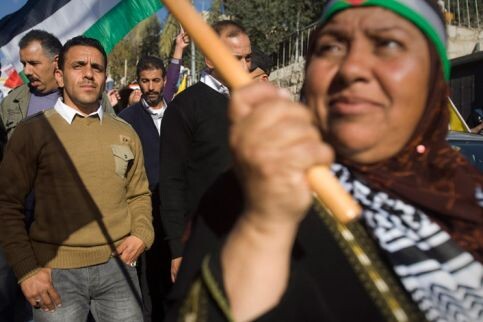
Protesters in Silwan, 24 December. (Oren Ziv/ActiveStills)
In the occupied East Jerusalem neighborhood of Silwan, Israeli troops sealed off the main road immediately after Friday prayers on 17 December and soldiers were stationed throughout the area. The Wadi Hilweh Information Center (SILWANIC) reported that a notably higher number of settler guard vehicles were parked near the Israeli settlement colonies inside the neighborhood, and that Israeli security firms had installed several cameras throughout the area (“Troops amassing in Silwan as Friday prayers draw to a close,” 17 December 2010).
The night before, SILWANIC reported that Israeli soldiers arrested an 11-year-old Palestinian child in Silwan as he returned from a school field trip. “Eyewitnesses report that 11-year-old Khadr Jamjoum received blows to the head as he was seized by Israeli soldiers,” SILWANIC stated. “Troops fired gas and sound bombs at the bus returning students to their homes after a school excursion, also firing gas grenades indiscriminately in the street and at shops, resulting in minor clashes between residents and Israeli troops and settler guards. Eyewitnesses also state that soldiers fired live ammunition during the clashes (“11 year old arrested by Israeli troops, clashes in Bir Ayyub,” 17 December 2010).
As The Electronic Intifada has reported, Israeli forces regularly kidnap, arrest, beat, interrogate and traumatize young Palestinian residents of Silwan in what residents say is an ongoing effort to force Palestinians out of the area.
Meanwhile, Adnan Gheith, a member of the al-Bustan Neighborhood Committee and a dignitary of Silwan, was served with a letter from the Israeli Home Front commander informing him that he will be expelled from Jerusalem for no less than four months, according to the Popular Struggle Coordination Committee (“Help Silwan resident Adnan Gheith stay in Jerusalem,” 23 December 2010).
The expulsion order is reportedly based on an administrative decree, without charges or evidence, by power of the British mandate-era Emergency Defense Orders decreed before the State of Israel was established. The PSCC said that this is intended to “curb Gheith’s political activity, since the [Israeli] security apparatus considers him to be a central instigator of unrest in Silwan.”
The PSCC stated that the neighborhood committee in Silwan was formed to oppose plans for massive house demolitions as the Jewish settlement project in the area expands, and that Gheith’s impending expulsion on the grounds of his community organizing constitutes “an experimental exercise of power on part of the Israeli police, the Shin Bet [Israel’s internal intelligence agency] and the Israeli army.”
Bethlehem
British photojournalist William Parry, author of the book Against the Wall: The Art of Resistance in Palestine, worked with two dozen Palestinian children from the Aida refugee camp in Bethlehem who used stencils to spray-paint “Merry Christmas from the Bethlehem ghetto” on Israel’s wall that runs adjacent to the camp (“Deck London’s halls with Bethlehem’s calls,” PULSE Media 20 December 2010).
“[Photographic] images of the children and their message — along with powerful images of checkpoints and life under occupation — will temporarily ‘hijack’ prominent wall spaces in central London throughout the week leading up to Christmas, with the help of projection artist Beverley Carpenter,” PULSE reported.
“Photos of these ‘hijacked’ spaces, of bringing the reality of Bethlehem to London’s walls, will then be circulated via the web around the world to amplify the message,” PULSE added.
Parry said that the idea of this art-based initiative is to provide “a stark political backdrop to the frantic Christmas shopping rush, to remind Britain and the West that Israel’s illegal occupation and separation wall are strangling Bethlehem — and Palestine — the birthplace of Christ and Christmas.”
“The children who painted the message on the wall are third- and fourth-generation refugees, at risk of being made refugees again because of the wall’s devastating impact,” Parry added. “We are complicit in suspending their rights to justice and freedom through our governments’ biased support of Israel.”
Tulkarem
Ma’an News Agency reported that Palestinian workers from Tulkarem district in the northern West Bank went on strike on 19 December to protest violence and harassment by private Israeli security guards who are stationed at a local checkpoint (“Workers on strike protesting humiliation at checkpoint,” 19 December 2010).
The workers, who hold jobs in Israel and inside Israeli settlements, reported to Ma’an that employees of the Israeli company stationed at the checkpoint “deliberately humiliate” workers as they cross. Ma’an reported that approximately 2,000 Palestinian workers participated in the strike.
Tel Aviv
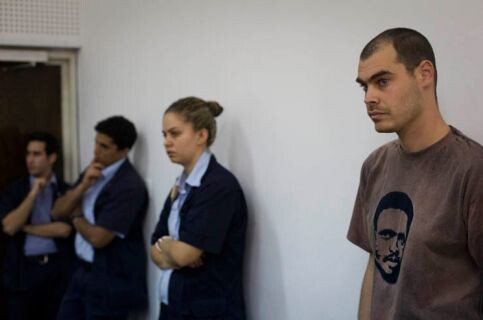
Jonathan Pollak at court in Tel Aviv, 27 December. (Oren Ziv/ActiveStills)
On Monday morning, 27 December, Yonatan Pollack, an activist with the Popular Struggle Coordination Committee, was sentenced to three months in prison by an Israeli court for his participation in a bicycle-riding protest through the streets of Tel Aviv during Israel’s 2008/09 assault on Gaza.
The PSCC reported that the Tel Aviv Magistrates court judge convicted Pollack of “illegal assembly” and ruled that he will go to jail on 11 January 2011. “The conviction activates an older three-month suspended sentence, imposed on Pollack in a previous trial for protesting the construction of [Israel’s wall in the West Bank] (“PSCC media coordinator sentenced to 3 months in prison,” 27 December 2010),” PSCC stated.
Pollack’s lawyer, Gaby Lasky, argued that Pollack was “singled out” of the protest by Israeli police who recognized him from previous demonstrations, and that the entire protest itself was singled out because of its political alignment.
In a statement to the court, Pollack said that he “will go to prison wholeheartedly and with my head held high.”
He added, “[i]t will be the justice system itself, I believe, that ought to lower its eyes in the face of the suffering inflicted on Gaza’s inhabitants, just like it lowers its eyes and averts its vision each and every day when faced with the realities of the occupation.”
Seattle, United States
Finally, in Seattle, Washington, solidarity activists with the Seattle Mideast Awareness Campaign bought advertising space on 12 city buses that read “Israeli War Crimes: Your tax dollars at work.”
The ads were slated to go up on 27 December, but King County Executive Dow Constantine officially rejected the plan, and stated that he has subsequently suspended all noncommercial advertising on Metro Buses, according to the Seattle Post-Intelligencer (“After Israel flap, Constantine bans certain bus ads,” 23 December 2010). Constantine’s decision followed an aggressive campaign by Zionist groups such as the Jewish Federation, StandWithUs, American Jewish Committee, and the Anti-Defamation League who claimed that the ads were “anti-semitic.” Additionally, the anti-Muslim organization American Freedom Defense Initiative had planned to launch an ad campaign in response, with signs calling for stopping “the funding of Islamic anti-semitism,” and another one that would have read: “In any war between the civilized man and the savage, support the civilized man: Support Israel, Defeat Islamic Jihad.”

